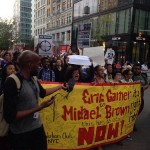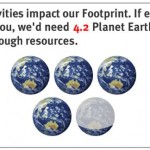I feel moved to confess something about my own race-based fear, prompted by this passage from a post by Sophia A. Nelson on The Root (www.theroot.com):
“In the final analysis, we Americans continue to be cowards about race. We refuse to talk about institutionalized racism and cultural biases that affect our everyday judgments as people. And until we ‘go there,’ for real, with the support of our political leaders, clergy, educators and industry executives, nothing will change.
The fact that we have a black president in America does not mean we live in a ‘post-racial’ America. It is, however, my ardent hope that Ferguson will teach us, as an American family, something life changing: that stereotypes, and fear of one another, can be deadly. History has proved this with slavery, the Holocaust, ethnic cleansing and war.”
Okay – for real: In a public encounter with a man I don’t know, I experience significantly more fear if the man is black than if he is white. And the fear increases exponentially if I encounter a group of men.
There, I’ve confessed.
Of course, as a woman, I am fairly cautious about any public encounters with men I don’t know. But I can’t deny that race biases my concern.
Why do I feel this way? Do I believe black men are fundamentally more dangerous for some mysterious genetic reason? Definitely not, I think that’s ridiculous.
I am more afraid of black men than white men because I am well aware black people have countless reasons to be really angry at white people. And every time another unarmed black man is shot and killed by a police officer, that list of reasons just gets longer.
Frankly, I can feel pretty intimidated by black women too. Like many well-meaning liberals, I sometimes walk on egg shells in interactions with people of color, waiting for the moment I betray my prejudice and ignorance and they rip me new one. (The Urban Dictionary defines this idiomatic phrase: “Literal expression means to tear someone a new butt-hole, figuratively means to verbally or physical abuse or criticize someone thoroughly so that they feel destroyed.”) The worst part about facing this kind of criticism is knowing full well I deserve it.
There are many ways I can intellectually argue with my fear around race. Not all black people are angry. My fear just makes things worse. But intellectual arguments don’t seem to touch what I feel.
Fear resides deep in the body. It’s what makes a police officer immediately shoot a twelve-year-old boy because he thinks the boy is playing with a gun. He knows this boy has faced racism and dis-empowerment, and that because of this there is cultural gap between them. The officer doesn’t really understand the person he is facing, and that increases the apprehension. He knows the boy faces huge obstacles to achieving “the American dream” and that his youthful energy is easily channeled into rage. He knows police officers represent white power and he may be a focus for that rage.
Now imagine if the boy is white. The police officer probably thinks with compassion and concern about how troubled the boy is if he is brandishing a gun. The officer thinks very carefully about how to defuse the situation without injuring the young man. Even if he must risk his own life or take a significant amount of time doing it, he will look for creative ways to reach out to the boy. The officer thinks of the child’s family, and can’t fathom depriving them of their son.
The difference made by the presence or absence of racially-based fear is huge.
What can we do about this? We can’t instantly erase all the reasons for black people to be angry at white people, although we should definitely start (or continue) that process.
In the shorter term, we can recognize that although we may feel fear, that does not mean the fear is justified. When the adrenaline starts coursing through us we tend to make a huge error in judgment: We’re experiencing a fear reaction, therefore we conclude there is a threat. Sadly (or fortunately?), the vast majority of the time this is not the case. I can pretty much guarantee it’s not the case when a twelve-year-old boy is involved.
A reaction is just a reaction, not a reflection of reality. It’s time we all take responsibility for ourselves and risk trusting one another.
Photo: Tamir Rice, shot by police in Cleveland on Nov. 22nd, died on Nov 23rd












